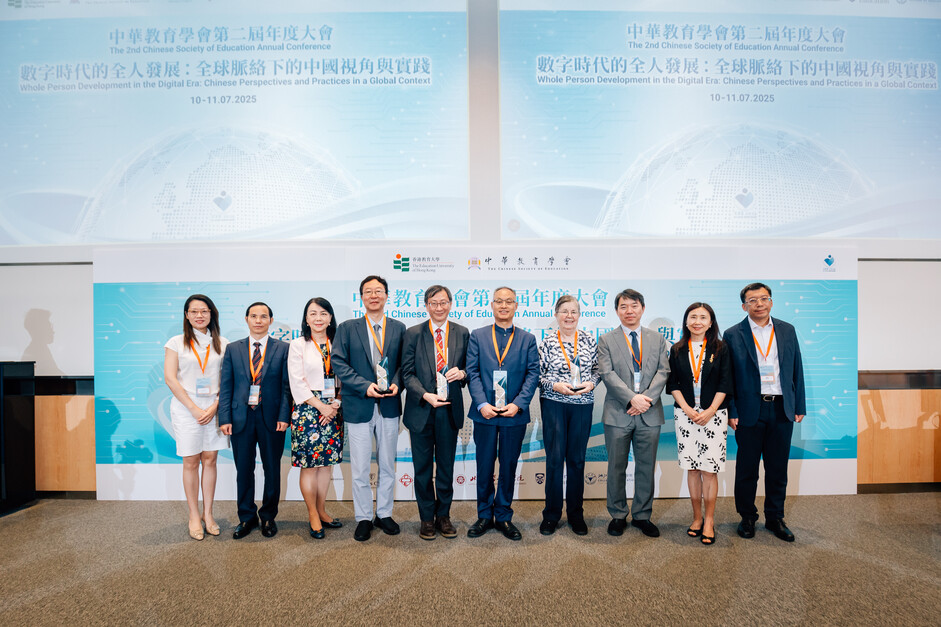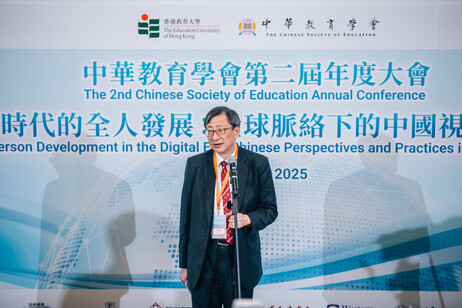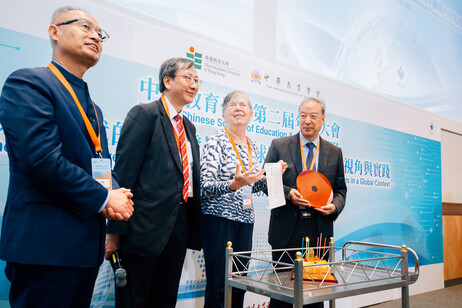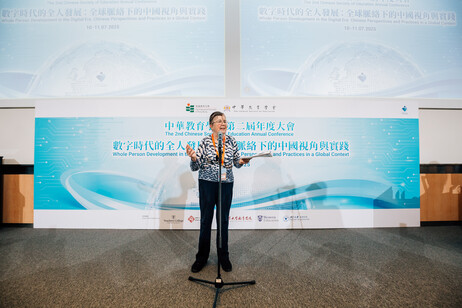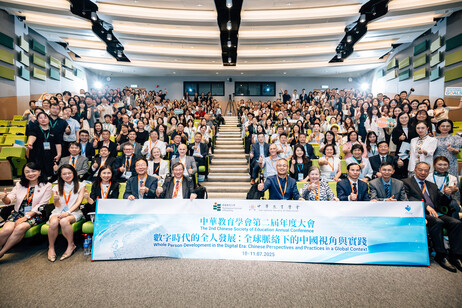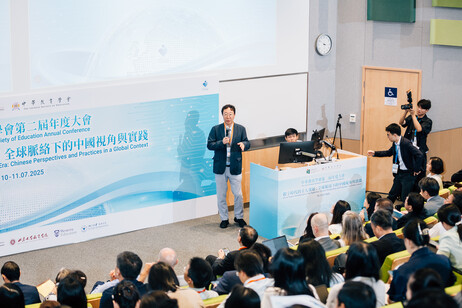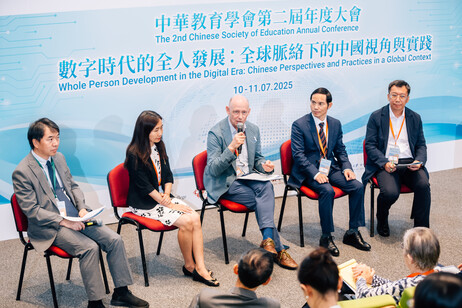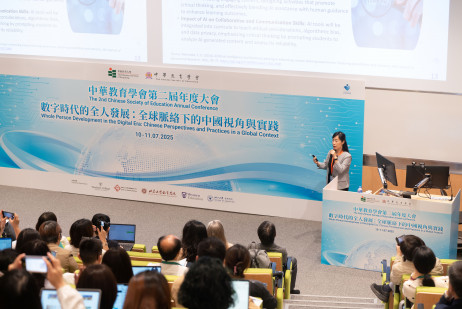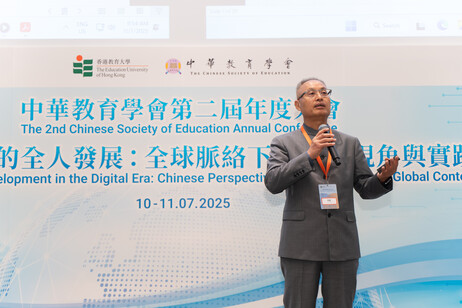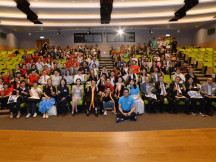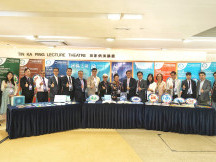EdUHK Hosts Over 300 Experts for 2nd Chinese Society of Education Annual Conference, to Explore Whole-Person Development in the Digital Era
On 10 and 11 July, The Education University of Hong Kong (EdUHK) hosted the 2nd Annual Conference of the Chinese Society of Education (CSE). Under the theme ‘Whole-Person Development in the Digital Era: Chinese Perspectives and Practices in a Global Context’, the event brought together over 300 education professionals and researchers from Australia, Canada, Singapore, the United Kingdom, the United States, Mainland China, Hong Kong SAR and beyond. They explored core challenges and innovative solutions in the education sector, in the context of rapid technological advancement.
The conference was organised by EdUHK and co-hosted by Columbia University, Peking University, Western University and Zhejiang University (listed in alphabetical order). The conference featured a diverse range of topics, including six keynote speeches, five distinguished panel forums, three symposiums, and over 30 parallel sessions. These sessions covered key areas such as AI-empowered education, whole-person development, and educational transformation. Participants engaged in comprehensive discussions on strategies for student skills development, the evolving role of teachers, and school innovation.
In his opening remarks, Professor John Lee Chi-Kin, President of EdUHK and Rotating President of the CSE for 2025, said, “Whole-person development is not only about enhancing individual qualities and capabilities, but also essential to advance societal progress and long-term national prosperity.” Professor Lee also delivered a keynote speech entitled ‘Perspectives of Whole-Person Education and Whole-Person Development: Insights from Life Education, Chinese Culture and Education, and Beyond’. In his speech, he delved into fundamental questions regarding the meaning, scope and essential knowledge of whole-person education and development. Drawing on insights from life education and traditional Chinese philosophy, Professor Lee examined their profound implications for shaping a holistic approach to education in today’s complex world, ultimately aiming to empower individuals for comprehensive development in both personal and societal dimensions.
A distinguished line-up of internationally renowned scholars delivered keynote speeches on various topics and engaged in lively discussions. Professor Gu Mingyuan from Beijing Normal University (online) pointed out that teachers need to address both conceptual and technical challenges regarding the effective use of digital technology. It is essential to balance the relationships between technology and humanities, modernity and tradition, as well as the virtual and the real. Professor Li Wei from University College London introduced the concept of ‘co-learning’, challenging the traditional dynamic between teacher and learner. He suggested that both should learn from each other, in order to achieve desirable learning outcomes.
Professor May Cheng May-hung from EdUHK shared recent research findings showing that local culturally responsive learning activities effectively promote greater interest in science education. This approach prepares students to think critically about the world around them, which is a very important skill in the AI era. Emeritus President of EdUHK, Professor Ruth Hayhoe from University of Toronto expressed her joy at returning to her second hometown. She opened her speech in fluent Cantonese, highlighting how the CSE embodies the concept of ‘Harmony in Diversity’, providing insights on how to address the extreme geo-political polarisation within and across many countries at present. In her keynote speech, Professor Hayhoe focused on creativity and the Chinese language, introducing her new co-authored book, Musical Talent and Its Promotion in the Chinese and Western Worlds, with hope for a better understanding of Chinese educational traditions.
Professor Li Jun from Western University and founding president of the CSE called on teachers to become ‘professional improvers’ and urged schools to transform into sustainable, continuously improving organisations. He introduced the concept of ‘professional improving communities’ as a catalyst for meaningful educational advancement both in China and internationally.
The distinguished scholar forum was one of the highlights of the conference, which gathered educational leaders from top global institutions. In the inaugural forum, Professor Bruce Macfarlane, Dean of the Faculty of Education and Human Development and Chair Professor of Educational Leadership at EdUHK, was joined by Dr Cheng Henan, Executive Director of the Center on Chinese Education at Columbia University; Professor Jiang Kai, Dean of the Graduate School of Education at Peking University; and Professor Kan Yue, Dean of the College of Education at Zhejiang University. They engaged in an in-depth discussion on educational leadership development, the construction of values amid global transformation, and the importance of cultural dialogue, offering strategic perspectives on elevating Chinese education within the global arena.
EdUHK’s hosting of the CSE annual conference highlighted its unwavering commitment to driving educational innovation in the digital era, as well as its growing global influence in higher education. EdUHK will continue to champion the integration of Chinese wisdom with international insights, and shape a forward-looking educational ecosystem poised to empower the next generation.
—Ends—
EdUHK Hosts Over 300 Experts for 2nd Chinese Society of Education Annual Conference, to Explore Whole-Person Development in the Digital Era
Download all images